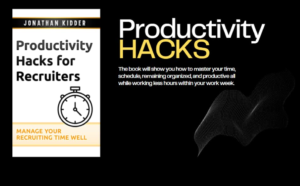
Time management is crucial in talent sourcing because the process of finding, attracting, and hiring top talent can be a lengthy and demanding task. Effective time management ensures that recruiters and hiring managers can allocate their time wisely, focus on the most important tasks, and meet the hiring needs of their organization within the desired timeframe. It helps them to avoid wasting time on inefficient processes, such as reviewing resumes that do not meet the minimum requirements, or spending too much time on a single candidate, which can delay the hiring process.
Additionally, good time management skills enable recruiters to maintain clear communication with hiring managers, candidates, and other stakeholders throughout the talent acquisition process, which is essential for ensuring a positive candidate experience and building a strong talent pipeline for future hiring needs.
Why is it easy to get distract in talent sourcing?
Talent sourcing is an essential stage of the recruiting process, but it can be time-consuming and challenging to navigate. There are several reasons why it’s easy to waste time during talent sourcing stages of the recruiting process:
Searching for the wrong candidates :One of the biggest time-wasters in talent sourcing is spending time on candidates who do not meet the necessary qualifications or are not a good fit for the role. Recruiters should have a clear understanding of the job requirements and target their search accordingly.
Inefficient sourcing methods: Using outdated or inefficient sourcing methods can also waste time. For example, manually sifting through resumes or relying on one job board may not yield the best results. Recruiters should use a variety of sourcing channels, such as LinkedIn, job boards, and referrals, to increase their chances of finding the right candidates.
Poor communication: Communication breakdowns between recruiters and hiring managers can lead to wasted time. If recruiters are not aligned with the needs of the hiring manager, they may spend time on candidates who are not a good fit.
Over-analyzing candidates: Spending too much time analyzing candidate resumes or conducting extensive background checks can also be a time-waster. Recruiters should focus on the most important criteria and avoid getting bogged down in minor details.
Lack of focus: Finally, multitasking or getting distracted can also waste time during talent sourcing. Recruiters should create a focused and dedicated workspace, free of distractions, to stay on track and optimize their productivity.
How to manage your time during talent sourcing:
As a recruiter, here are some tips to manage your time effectively during talent sourcing and research:
Set clear objectives and priorities: Identify the most important tasks that need to be accomplished and prioritize them accordingly. This will help you to stay focused on what is most important and avoid wasting time on less important tasks.
Use technology to your advantage: Leverage technology such as Applicant Tracking Systems, job boards, and candidate databases to streamline your sourcing process and save time.
Create a schedule and stick to it: Set aside dedicated blocks of time for talent sourcing and research each day and create a schedule to manage your workload. This will help you to stay on track and avoid getting overwhelmed.
Take breaks: It’s essential to take regular breaks to recharge and avoid burnout. Taking short breaks can help you stay fresh and focused when you return to work.
Collaborate with colleagues: Work with colleagues to delegate tasks and collaborate on the sourcing process. This can help you to share the workload, stay on track, and save time.
Continuously evaluate and optimize your process: Regularly evaluate your talent sourcing and research process and identify areas where you can make improvements to save time and increase efficiency. This may involve refining your search criteria, adjusting your sourcing channels, or modifying your communication approach with candidates.
Using tools to track your talent sourcing time:
There are several online tools available to help you track your time. Here are some of the popular ones:
Toggl: A popular time tracking tool that allows you to track time for different projects and tasks. You can also generate reports to analyze how much time you spent on each activity.
RescueTime: A productivity tool that tracks your time spent on different websites and applications. It can also send you weekly reports on your productivity and suggest ways to improve your work habits.
Harvest: A time tracking tool that integrates with project management software such as Asana, Trello, and Basecamp. It also offers invoicing and billing features.
Clockify: A free time tracking tool that allows you to track time for unlimited projects and tasks. It also offers reporting features to analyze your time data.
Time Doctor: A comprehensive time tracking and productivity tool that tracks time for tasks, websites, and applications. It also offers features such as distraction alerts, screenshots, and integrations with project management tools.
MyHour: A time tracking tool that allows you to track time for different projects and generate reports for analysis. It also offers invoicing and billing features.
I recommend reading my time management book: Productivity Hacks for Recruiters which available on amazon here
Recommended Reading:
A Christian Perspective on Talent Sourcing
Dealing with career obstacles in the recruiting field
How to Find a Hidden Job Market for Recruiting Jobs
- Unlocking the Power of Perplexity AI: Why Recruiters Should Utilize This Revolutionary Tool - February 11, 2024
- Exploring AI Interviewing Assessment Tools: A Comprehensive Review - November 30, 2023
- PartyRock a Sandbox for Talent Sourcing - November 29, 2023

